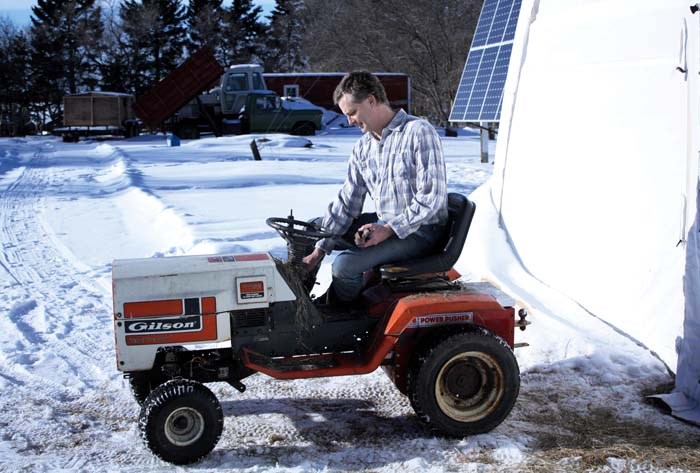When people think about going “off-grid,” they often envision a life of sacrifice akin to camping or going back in time.
Brian and Yvonne Bueckert, a couple with a farm just northeast of Yorkton, are proving that does not necessarily have to be the case.
Brian has always dreamed of being energy self-sufficient since he was a teenager. Yvonne was willing to go along but not at the expense of foregoing the luxuries of modernity.
“Going off grid has to be comfortable,” she said.
Their home is just that, a cozy, two-storey with all the creature comforts. They enjoy TV, Internet, fridge and freezer, washer and dryer, daily hot showers, microwave, even a bread maker, just like the rest of us. They also now enjoy not receiving that monthly statement from the electric company.
In fact, about the only luxury they did give up was the dishwasher, but Yvonne noted that turned out to be a blessing in disguise.
“It simply uses too much water and electricity to be practical, but the unexpected bonus of washing and drying dishes by hand is that dish-time has become a wonderful family chatting and bonding time and my dishes are actually cleaner,” she said.
The Journey
It all started in high school.
“Brian has always been fascinated by windmills,” Yvonne recalled. “I remember when we were still dating there was a guy close to Saskatoon on a farm, who had a windmill and Brian would go out there and drive past and look at the windmill with awe, so that was neat.”
“Until I met Brian, I was 100 per cent city girl and then he talked about energy stuff and I’m always fascinated by gizmos and gadgets and things so his interest in electronics brought me along. Sometimes I’ve been a bit skeptical about some of the things he wanted to try, but it’s always worked out good so I’ve enjoyed the journey.’’
After marrying and graduating from post-secondary education, Yvonne with a B.Sc. and Brian a diploma in Electronics, they went to work in Yukon where they met a couple from Yorkton. When those friends returned to Yorkton, they contacted Brian and Yvonne about a job opportunity here.
Since they bought the farm, they have been slowly, working toward independence from the electrical grid.
They started with a small 400-watt windmill to run the lights. Later, they added solar panels to switch over the refrigerator and freezer.
“Our intention was to continue to grow the system as we could afford it, and move our appliances and our house onto that system,” Yvonne explained.
Approximately a year and a half ago, after 11 years of chipping away at their dependence on SaskPower, the timing was about to become right to cut the umbilical cord completely.
“It boils down to economics,” Brian explained. “Fifteen years ago solar panels were selling for 12 dollars a watt, today solar panels are selling for a dollar-thirty per watt. Fifteen years ago our solar panels would have cost about 40 thousand bucks, but today it’s just four grand.”
They decided it was time to take the plunge. They already had their bank of batteries and had calculated what it would take to achieve the goal.
“You have to size your system based on the longest night of the year, that’s why we went with the four kilowatt [solar] array and the one-and-a-half kilowatt windmill, because I didn’t want to have to run a generator for two months straight, that would defeat the purpose of going off grid.”
July 25, 2014 was liberation day. SaskPower came out and took away their meter.
“It was exciting, but scary,” Yvonne said.
Brian likened it to another rite of passage.
“Once you go off on your own, you’re on your own,” he said. “It’s like the first time you move out of your parents’ house, there’s a little bit of fear and trepidation going on.”
There were growing pains. The day they switched over, a visiting family member took a shower that caused their first off-grid power outage. The well pump and the septic pump came on at the same time and the startup demand overloaded their inverter.
“I’m not a scientist, I’m just an average Joe Blow,” Brian said. “I just love to experiment. I took into consideration each load and when the loads were running, but I didn’t take into consideration when each load would start and if they ever started simultaneously. I didn’t quite finish the math on that.”
It was an easy fix, though, and they were up and running again in no time.
Philosophy
The Bueckerts are not Luddites by any stretch of the imagination. They love technology.
And they are not hippies, eschewing the trappings of modernity for a back-to-nature lifestyle. As Yvonne says, “outhouses are for camping.”
But they do have an underlying philosophy of living lightly on the land, as in minimizing their environmental impact.
To that end, there are several other innovations on the farm that reduce the couple’s carbon footprint significantly.
For example, they replaced an old, inefficient furnace with a grain burning stove. Because they just happen to be organic grain farmers, they have all the grain they need to heat their home in the winter, and, Brian said, burning grain has a less than net-zero impact because burning it emits less carbon than it takes up when growing.
He has also converted a garden tractor to be fully electric and use up some of the glut of power they have in the summer.
Also the couple makes their own biodiesel from grease they collect from local restaurants. They use it in their own vehicles and farm equipment in a 50-50 mixture with commercial fuel.
To learn more about this couple’s remarkable story, visit www.bueckert.ca or email [email protected].



